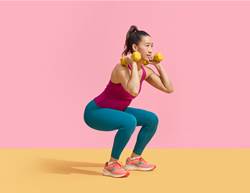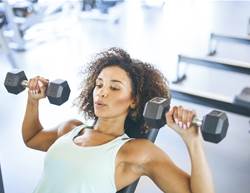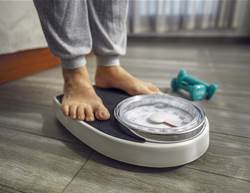Susie Chan took up running at age 35. Within a few years she had run the Marathon des Sables more times than any other British woman, broke a 12-hour treadmill World Record and competed in some of the hottest places on earth. She is now a global Peloton instructor, one of the most popular runners on Instagram and has featured on the cover of several magazines.
In a world that often equates youth with fitness, Chan, now 48, has helped shatter stereotypes and celebrate the power of embracing fitness during perimenopause.
After experiencing symptoms of night sweats, hot flushes and lower energy in perimenopause, Chan found movement to be the key to managing her symptoms.
We spoke to Chan about how women can start or maintain exercise through their perimenopause journeys.
How do you stay motivated to exercise while experiencing perimenopause?
“Some days are harder than others to find motivation. Based on my own experience with perimenopause, I might be fine for three weeks and then find it tougher for a whole week.
“I know that movement benefits me and helps with perimenopausal symptoms. I do genuinely love running, and that will usually get me out the door or on the treadmill no matter how I feel, because I know I can always go slower or cut the run short if I’m not feeling my best.
“Sometimes viewing it as a social thing is helpful too. If I know my friends are waiting on me, and that motivates me for sure.”
How has exercise helped you manage your symptoms?
“I absolutely believe that movement is helping me through my perimenopause. Things change day to day, but exercise keeps me accountable and helps me prioritise my health.
“I love doing yoga as it really helps my mobility and flexibility which I need to work on as I get older.
“Strength work also helps me, especially as I run so much. I know doing this work will help future proof my body as I age and help keep my joints and bones strong.”
What advice would you have for women who aren’t that active yet – how can they get started?
“First of all, congratulate yourself for looking into it and starting. Exercise doesn’t have to look the same for everyone. Don’t overdo it and burn out. Try to maintain some consistency and build up slowly.”
What’s your advice for when you want to exercise but menopause symptoms are affecting you?
“It’s all about listening to your own body and taking time for yourself, whether to exercise and move your body, or to rest and take that break when necessary. Don’t be hard on yourself, and remember you can only do your own personal best in those moments, especially when you might be feeling vulnerable.
“Go slower, stop and have a break, walk instead of run. Respect and love your body through each stage of menopause and beyond.”
What tips do you have for staying active throughout menopause?
1.“Try to avoid putting pressure on yourself. I really believe the less pressure and expectations you’re fighting in your own mind, the more fun and enjoyment there is to be had in exercise. Don’t worry about comparing yourself to others, you can only be you and do the best you can, whatever that looks like on the day.”
2.“Be grateful for what your body is able to do, and know that this looks different for everyone. It wasn’t until I was in my mid-30s that I discovered running, and having not come from a fitness background, I never would’ve imagined that one day I’d become a Peloton Instructor. Use your body in whatever way makes you feel good and strong.”
3.“Harness your energy and set achievable goals. This can allow you to tailor your needs to suit your own health and ability, and challenge yourself in small ways to improve all the time. This can be on a small scale, but don’t underestimate the motivation behind a personal best!”







.png&h=193&w=250&c=1&s=1)


